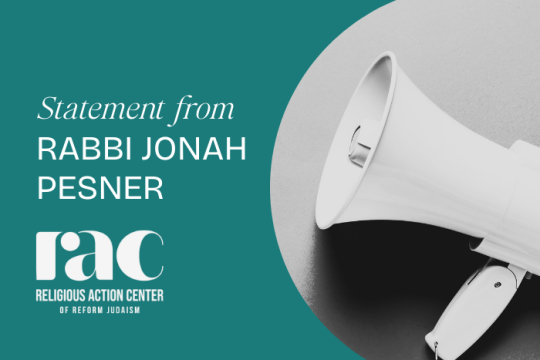July 8, 2025 - In response to the IRS’s decision to limit the Johnson Amendment by allowing houses of worship to endorse candidates without jeopardizing their tax-exempt status, Rabbi Jonah Dov Pesner, Director of the Religious Action Center of Reform Judaism, released the following statement:
“We are deeply alarmed by the IRS’s decision to allow houses of worship to endorse political candidates while maintaining their non-profit status. The clear implication is that church funds can now, for the first time, be used for such endorsements or opposition to candidates and parties. This decision further weakens campaign finance laws, raising the prospect of political donors contributing to houses of worship to support such partisan purposes and obtaining a tax deduction for such ‘contributions.’ This change in policy weakens the principle of church-state separation that has protected both government and religion, allowing diverse religious communities—including our own—to flourish.
Permitting synagogues and other houses of worship to endorse or oppose candidates undercuts the integrity and unity of these religious institutions, turning them into an extension of political candidates or parties. Because of the hyper-partisan quality of contemporary politics, this risks dividing congregations and alienating those supporting different parties or candidates, thereby threatening the congregation’s status as a place where all feel welcome, rooted in faith teachings and transcending partisanship.
We call on Congress to reverse this deeply misguided policy, which is not only dangerously divisive but also opens the door to significant abuse, undermining both the democratic process and the public’s trust in the integrity of our religious institutions. At a time when religious communities routinely livestream services and share sermons online, thereby offering a backdoor for spreading partisanship far beyond actual congregants, we reject the IRS’s claim that political endorsements by clergy are similar to ‘a family discussion concerning candidates.’ This decision fails to recognize the realities of modern spiritual life and could expose clergy, including rabbis and cantors, to unjust scrutiny as they fulfill their sacred duty to teach, guide, and inspire. During a time of intense political polarization, we continue to support our rabbis’ and cantors’ abilities to lead diverse congregations with moral courage.”
Explore Jewish Life and Get Inspired
Subscribe for Emails


